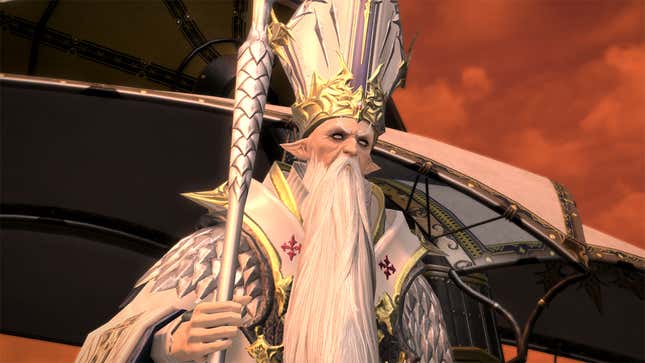
As part of a larger blog reiterating the Final Fantasy XIV team’s disapproval of mods following their prevalence in a high-profile raid event, producer and director Naoki Yoshida promised to improve the massively popular game’s HUD to match the functionality of these unofficial tools.
“We believe that people use [mods] to expand the HUD and display more information because they feel that existing functions are insufficient for tackling high-end duties,” Yoshida wrote. “In recognition of this, we intend to review the most prominent tools, and in order to discourage their use, endeavor to enhance the functionality of the HUD. Though it will take some time, we’re determined to make it happen—not least for the benefit of those who play on consoles.”
Final Fantasy XIV mods have long occupied a gray area in terms of legality. While the game’s terms of service forbid “third-party tools,” Square Enix tends to look the other way so long as folks aren’t blatant about using them. This allows players to independently bolster Final Fantasy XIV’s middling visuals as well as expand the information provided by the HUD, as was seen during the recent race to finish its latest ultimate raid, Dragonsong’s Reprise.
When a Red Mage player on the first team to complete Dragonsong’s Reprise released POV footage of the accomplishment, some in the Final Fantasy XIV community criticized the high-level raider for using mods. The video, which has since been pulled from YouTube by a Square Enix copyright claim, showed several unofficial plug-ins in effect, including overlays that expanded the HUD with information on bosses and teammates normally not provided by the game.
Another video from the team’s Monk with no visible performance-enhancing plug-ins, however, remains up. Kotaku contacted Square Enix about the Red Mage video’s removal but did not hear back immediately.
With so many keeping tabs on the event (including Square Enix itself), Yoshida apparently felt it was necessary to repeat the Final Fantasy XIV team’s wishes when it comes to these third-party tools.
“It goes without saying that we’re aware of world races for high-end duties,” Yoshida said. “As the developers, we’re proud to have grown into one of the few games where they’re held, and it delights us to see so many players participate as well as spectate with great interest. But a race should be fair, and it’s our earnest wish that participants don’t use third-party tools. Indeed, we’ve only released duties that we have proven can be beaten with the game’s standard features.”
Yoshida added that Square Enix may stop congratulating race-winning teams through official channels should this public recognition “encourage excessive competition and controversy to the extent that players resort to third-party tools.”
Any level of competition will inevitably encourage competitors to look for advantages over their opponents, especially when those advantages are so widespread. Lance Armstrong, for instance, may have become the face of the doping scandal in professional cycling, but he was far from the only person doing it. One could say mods are almost required for any serious group hoping to win one of these Final Fantasy XIV races because they would only put themselves at a disadvantage by abstaining.
In any case, the situation is clearly reaching a boiling point. The recent public outcry, warranted or not, means Final Fantasy XIV mods can no longer exist in the comfortable gray area they’ve occupied for the last several years, at least as far as the world’s first events are concerned. Fortunately, it seems as if Yoshida and his team see this moment as an opportunity for introspection and improvement rather than outright condemnation.